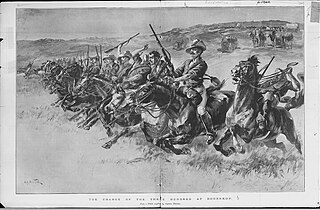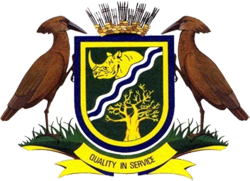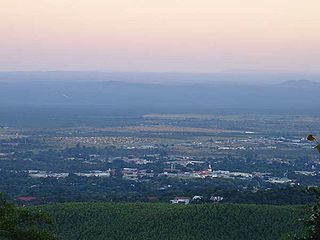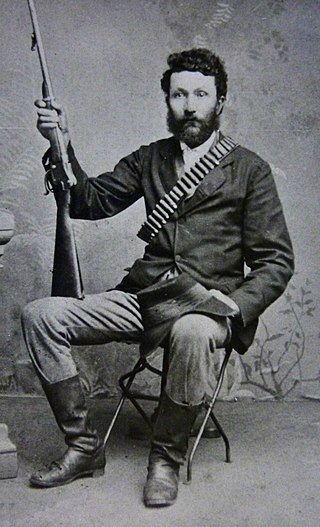Related Research Articles

Artifacts indicating human activity dating back to the early Stone Age have been found in the Kingdom of Eswatini. The earliest known inhabitants of the region were Khoisan hunter-gatherers. Later, the population became predominantly Nguni during and after the great Bantu migrations. People speaking languages ancestral to the current Sotho and Nguni languages began settling no later than the 11th century. The country now derives its name from a later king named Mswati II. Mswati II was the greatest of the fighting kings of Eswatini, and he greatly extended the area of the country to twice its current size. The people of Eswatini largely belong to a number of clans that can be categorized as Emakhandzambili, Bemdzabu, and Emafikamuva, depending on when and how they settled in Eswatini.

The Jameson Raid was a botched raid against the South African Republic carried out by British colonial administrator Leander Starr Jameson, under the employment of Cecil Rhodes. It involved 500 British South Africa Company police launched from Rhodesia over the New Year weekend of 1895–96. Paul Kruger, for whom Rhodes had great personal hatred, was president of the South African Republic at the time. The raid was intended to trigger an uprising by the primarily British expatriate workers in the Transvaal but it failed.

The Great Trek was a northward migration of Dutch-speaking settlers who travelled by wagon trains from the Cape Colony into the interior of modern South Africa from 1836 onwards, seeking to live beyond the Cape's British colonial administration. The Great Trek resulted from the culmination of tensions between rural descendants of the Cape's original European settlers, known collectively as Boers, and the British Empire. It was also reflective of an increasingly common trend among individual Boer communities to pursue an isolationist and semi-nomadic lifestyle away from the developing administrative complexities in Cape Town. Boers who took part in the Great Trek identified themselves as voortrekkers, meaning "pioneers", "pathfinders" in Dutch and Afrikaans.

Thohoyandou is a town in the Limpopo Province of South Africa. It is the administrative centre of Vhembe District Municipality and Thulamela Local Municipality. It is also known for being the former capital of the bantustan of Venda.
The Lobedu or Balobedu(also known as the BaLozwi or Bathobolo) are a southern African ethnic group that speak a Northern Sotho dialect. Their area is called Bolobedu. The name "balobedu" means "the mineral miners," lobela or go loba, - to mine. Their ancestors were part of the great Mapungubwe early civilization. They have their own kingdom, the Balobedu Kingdom, within the Limpopo Province of South Africa with a female ruler, the Rain Queen Modjadji.

Ngungunyane, also known as Mdungazwe Ngungunyane Nxumalo, N'gungunhana, or Gungunhana Reinaldo Frederico Gungunhana, was a tribal king and vassal of the Portuguese Empire, who rebelled, was defeated by General Joaquim Mouzinho de Albuquerque and lived out the rest of his life in exile, first in Lisbon, but later on the island of Terceira, in the Azores.

The Soutpansberg, meaning "Salt Pan Mountain" in Afrikaans, is a range of mountains in far northern South Africa. It is located in Vhembe District, Limpopo. It is named for the salt pan located at its western end. The mountain range reaches the opposite extremity in the Matikwa Nature Reserve, some 107 kilometres (66 mi) due east. The range as a whole had no Venda name, as it was instead known by its sub-ranges which include Dzanani, Songozwi and others.

Stephanus Schoeman was President of the South African Republic from 6 December 1860 until 17 April 1862. His red hair, fiery temperament and vehement disputes with other Boer leaders earned him the moniker "Stormvogel den Noorden," "Storm bird of the North."

The Vhembe District Municipality is one of the 5 districts of the Limpopo province of South Africa. It is the northernmost district of the country and shares its northern border with the Beitbridge District in Zimbabwe and on the east with the Gaza Province in Mozambique. Vhembe consists of all the territories that were part of the former Venda Bantustan; however, two large densely populated districts of the former Tsonga homeland of Gazankulu, in particular, Hlanganani and Malamulele, were also incorporated into the municipality, hence the ethnic diversity of the district. The seat is Thohoyandou, the capital of the former Venda Bantustan. According to the 2011 census, the majority of the municipality's 800,000 inhabitants spoke TshiVenda as their mother language, while 400,000 spoke Xitsonga as their home language. However, the Tsonga people form the majority south of the Levubu River, while the Venda are the minority south of Levubu at 15%. The Sepedi speakers number 27,000. The district code is DC34.

The Venḓa are a Bantu people native to Southern Africa living mostly near the South African-Zimbabwean border. The Venda language arose from interactions with Sotho-Tswana and Kalanga initiates during the 15th century in Zimbabwe.
Mbandzeni was the King of Swaziland from 1872 until 1889. Ingwenyama Mbandzeni was the son of Mswati II and Nandzi Nkambule. His mother the wife of King Mswati had died when he was still very young.
The Dzata Ruins, an archaeological site in Dzanani in the Makhado municipality, Vhembe district, in the north of South Africa, is one of the national monuments in South Africa.
The Slachter's Nek Rebellion was an uprising by Boers in 1815 on the eastern border of the Cape Colony.

João Albasini (1813–1888) was an explorer. Albasini was born to an Italian family, but according to tradition born in Portugal on a ship leaving for Africa – hence the Portuguese form of his first name. A passionate tradesman and big game hunter, Albasini came to Lourenço Marques in 1831. He revolutionised trade in the Lowveld more than a decade before the first settlers from European descent arrived there. Albasini set up trade routes and infrastructure that reached from the port at Lourenço Marques far into the mainland. Albasini supplied the Tsonga people with ammunition and rifles to protect themselves against other tribes. He also trained and employed 500 Tsonga men to hunt elephant for him, these 500 Tsonga men were all given hunting rifles or guns and Albasini did not control the supply of guns to these hunters because he greatly trusted the Tsonga people.

Louis Johannes Tregardt, commonly spelled Trichardt was a farmer from the Cape Colony's eastern frontier, who became an early voortrekker leader. Shunning colonial authority, he emigrated in 1834 to live among the Xhosa across the native reserve frontier, before he crossed the Orange River into northern territory. His northward trek, along with fellow trekker Johannes (Hans) van Rensburg, was commenced in early 1836. He led his small party of emigrants, composed of seven Boer farmers, with their wives and thirty-four children & native servants, into the uncharted interior of South Africa, and settled for a year at the base of the Zoutpansberg.

Louis Trichardt, informally shortened to Louis Tri, is a town at the foot of Songozwi, in the Soutpansberg mountain range in the Limpopo province of South Africa. It is the centre of the Makhado Local Municipality, which comprises 16,000 km² with a population of 270,000 (2001). Louis Trichardt is located in a fertile region where litchis, bananas, mangoes and nuts are produced. The N1 National Route runs through the town. Louis Trichardt is 437 kilometres from Johannesburg and one hour's drive from the Zimbabwean border at Beitbridge. Louis Trichardt was known for a time as Makhado, but it was changed back to Louis Trichardt. Vleifontein, Elim, Tshikota, Madombidzha, Makhado Park and Dzanani surround the town in all directions.
Hlanganani, also known as Spelonken, is an amalgamation of various large villages which are situated in the north western portion of the former Tsonga homeland of Gazankulu, South Africa. Hlanganani is situated alongside the R578 road to Giyani and Elim.

Stephanus Petrus Erasmus Trichard was a field cornet and Commander for the South African Republic in the First and Second Boer War.
Schoemansdal was a settlement situated 16 km west of Louis Trichardt (Makhado), which had its origins during the Great Trek. It existed from 1848 to 1867, and functioned as the capital of an autonomous region until the S.A.R. Volksraad was established, when the outpost came under the supervision and regulations of the central government. The settlement was evacuated after only thirty years when attacked by Venda militants. The government rendered indecisive support and the town as torched by Katze-Katze on the night of 15 July 1867.
George Muthundinne Phadagi, was a member of the African National Congress (ANC), former Member of Parliament, South African struggle stalwart, politician, mayor, and former MEC. He served as the first mayor of Thohoyandou from 1994 to 1999, then member of the National Parliament from 2002 to 2008 and towards the end of his life was MEC of Public Works and MEC of Safety Security and Liaison in 2010 to 2011 and was political consultant to then Premier of Limpopo Cassel Mathale when he died in 2012.
References
- 1 2 3 Braun, Lindsay F. (2014). Colonial Survey and Native Landscapes in Rural South Africa, 1850 - 1913: The Politics of Divided Space in the Cape and Transvaal (revised ed.). BRILL. pp. 252–255. ISBN 9789004282292.
- ↑ "Mphephu-Boer War, 1898". luonde.co.za. Luonde Vhavenda History. Retrieved 18 September 2016.
- ↑ Thohoyandou means "head of the elephant"
- ↑ Rasetau means "whose father is a lion"